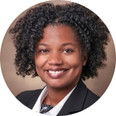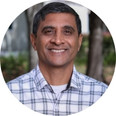LEAD Reverse Mentoring Pair
Celestial Jones-Paris and Thayumanasamy Somasundaram
 Celestial Jones-Paris, PhD, Reverse Mentor
Celestial Jones-Paris, PhD, Reverse Mentor
Celestial Jones-Paris is a clinical scientist and shared resource manager at the Vanderbilt Institute for Clinical and Translational Research. She graduated from Vanderbilt University with a doctorate in pathology and from Indiana University with a bachelor’s degree in biochemistry. Her education in basic sciences, business management, policy, and ethics has given her a unique perspective. She wants to continue to find ways to enhance medical research by directly engaging those who make it possible, from bench to bedside and to community.
What new skill do you seek to gain as a reverse mentor?
Jones-Paris: Mentoring is a multifaceted skill that goes beyond seniority. This reverse mentoring program excites me because it illuminates that a great mentor can still be a mentee and vice versa. My goal for participating is to be a good partner with an open mind who can help uplift and develop a mentee. I believe the test of a good mentor is to see their mentee putting lessons from them into action that benefit them in their career and life. By engaging with empathy and strategy, I will gain even stronger leadership skills while instilling new perspectives for a professional in the field.
How is mentoring important to your career development?
Jones-Paris: I cherish one's ability to be open to learning at all career stages. I can embrace someone's experience and meet them where they are so we can navigate the possibilities ahead together. As a mentor and mentee in past roles, I deeply recognize the impact of a good dynamic and know that I grow in my confidence in my field, uncover different approaches to processes, and hone my interpersonal skills through mentorship.
How does diversity and inclusivity impact your leadership style?
Jones-Paris: The journey that every individual goes through and the experiences that shape them often manifest as a unique viewpoint. My leadership style aims to support authentic and diverse perspectives. A key aspect of this is to include individuals from different career stages and backgrounds who can bring ideas that can help me lead in a thoughtful and strategic direction.
Celestial Jones-Paris is a member of Association of Biomolecular Resource Facilities, a FASEB member society.
 Thayumanasamy Somasundaram, Reverse Mentee
Thayumanasamy Somasundaram, Reverse Mentee
Thayumanasamy Somasundaram is a senior research associate and a distinguished university scholar at Florida State University (FSU), Tallahassee, Florida. For the past 30 years, he has been the director of an X-ray crystallography core facility at the Institute of Molecular Biophysics at FSU. Somasundaram is an executive committee member of the Association of Biomolecular Resource Facilities, an organization that promotes excellence in shared resource facilities worldwide, and a member of FASEB.
What new skill do you seek to gain as a reverse mentee?
Somasundaram: One of the aims is to acquire the skill of patient listening, especially when I meet people with opinions that are different from mine. I want to analyze the reasons behind their viewpoints, evaluate the pros and cons of all the views before making a final decision. I also want to gain an understanding of the obstacles younger members of my profession face as they climb the career ladder while maintaining a good work-life balance.
How is mentoring important to your career development?
Somasundaram: Working in a particular area of specialty for many years gives you lots of experience but also makes you think in a certain way when confronting a situation. Even though this is an advantageous skill, I realize that it may not necessarily be the only way of approaching all situations. Learning to think differently, especially with different perspectives, I believe, will give me an opportunity to see a much larger view about work and life. A mentor will give me this opportunity.
How does diversity and inclusivity impact your leadership style?
Somasundaram: Fortunately, due to my place of employment, I am surrounded by people with different socio-economic backgrounds, educational levels, scientific disciplines, and nationalities. In addition, for more than two decades, outside my work, I have also been involved in leadership roles with several multi-cultural and multi-ethnic organizations. Those experiences have taught me that despite many outward differences and variations, in general, all of us work toward a balanced life, good career opportunity, co-operation, and progress. By being inclusive, you acquire great ideas and find simple solutions which at times are beyond the purview of one’s own imagination or experience.
Thayumanasamy Somasundaram is a member of Association of Biomolecular Resource Facilities, a FASEB member society.